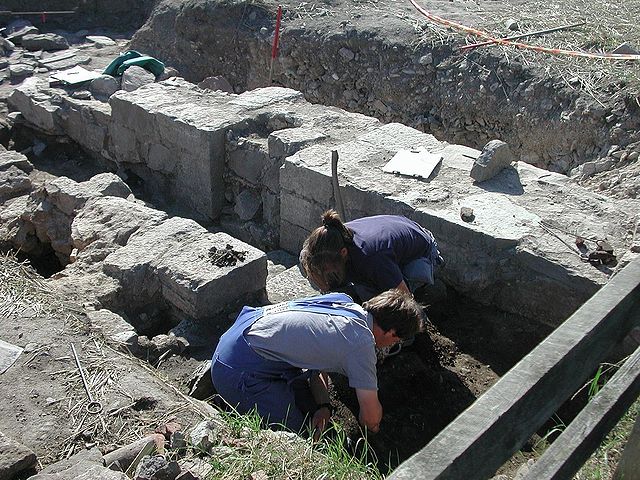My more-than-passing interest in ancient and medieval history, likely familiar to many long-time readers of Concerning History, has naturally led to more-than-passing familiarity with the field of archaeology. Indeed, a certain type of (irresponsible) archaeology led me to the field in the first place, as young Bryan could think of nothing more in the world he’d rather do as a career than follow in the footsteps of Indiana Jones. I even took an intro course in archaeology (and physical anthropology) during my first semester of college, and my Classics minor involved almost exclusively courses on ancient history with a heavy emphasis on the material record. Yet even though the academic end-product of archaeological study is, essentially, the same as what historians strive to produce (namely, greater understanding of the past), archaeology has always remained separate from history, classified as a subset of anthropology and officially considered one of the social sciences.
It shouldn’t be.
I’ve had a number of highly influential teachers in my life; one of them, Ian Isherwood, has received mention now and again here on Concerning History. Another, however, that I was privileged to work with at the same time was Dr. John David, with whom I took some form of ancient history for five straight semesters from sophomore through the beginning of senior years in undergrad. Himself an archaeologist, David consistently dealt in topics for which we have a dearth of written evidence, yet he was also very clear on one thing: archaeology is not a science.
The idea of what is and isn’t a “science” has grown quite muddled in modern society, the word often standing in for ideas like “logic” and “reason.” But if we take the definition of a science as a field of study that arrives at its body of knowledge through use of the scientific method, David is absolutely correct: archaeology cannot be considered one of the sciences. Perhaps the most important aspect of the scientific method is that the experiments conducted in the course of investigating hypotheses must be reproducible; that is, their conditions must be able to be re-created by someone other than the original scientist, and the results produced by those experiments must be the same. This is inherently impossible in the field of archaeology, where each “experiment” is a distinct site, governed by its own geography and composition and destroyed in the process of excavation. Archaeology does use a number of scientifically verifiable processes like carbon dating, but many of the field’s fundamental methods, like stratigraphy (the principle that the deeper an object is buried, the older it is relative to other objects at the site) are logical but technically unprovable as scientific rules.
So, in light of all this, what do archaeologists do, exactly? They search for and gather evidence, much of which is incomplete or less comprehensive than they would like. Through extensive training in interpretive techniques and prior literature in the field, they then take that evidence and advance responsible claims as to the events of the past. Sound familiar? Yes, I know, technically the field of history only deals with events that can be interpreted through written sources, but in a broader sense, it is clear to me that if archaeology must be placed underneath a larger umbrella discipline, it should be history. In fact, using this logic, many of the so-called “social sciences” need to be reexamined as such, as human beings’ unique development renders experiments in psychology or anthropology equally un-reproducible. The prestige that goes with the classification of a discipline as a science is a topic for another time, but for now, suffice it to say that, if we’re being honest with ourselves, I believe history (and the humanities) needs to encompass a wider array of methodologically similar efforts at understanding humans, humanity, and the human past. We can only benefit from these disciplines working in concert to expand our body of human knowledge.
